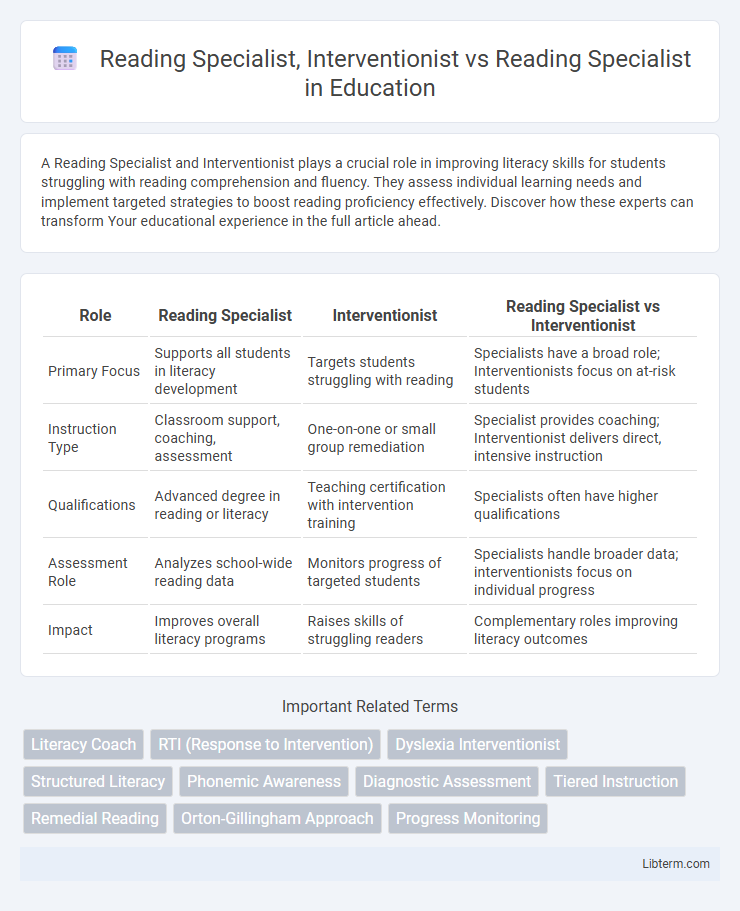A Reading Specialist and Interventionist plays a crucial role in improving literacy skills for students struggling with reading comprehension and fluency. They assess individual learning needs and implement targeted strategies to boost reading proficiency effectively. Discover how these experts can transform Your educational experience in the full article ahead.
Table of Comparison
| Role | Reading Specialist | Interventionist | Reading Specialist vs Interventionist |
|---|---|---|---|
| Primary Focus | Supports all students in literacy development | Targets students struggling with reading | Specialists have a broad role; Interventionists focus on at-risk students |
| Instruction Type | Classroom support, coaching, assessment | One-on-one or small group remediation | Specialist provides coaching; Interventionist delivers direct, intensive instruction |
| Qualifications | Advanced degree in reading or literacy | Teaching certification with intervention training | Specialists often have higher qualifications |
| Assessment Role | Analyzes school-wide reading data | Monitors progress of targeted students | Specialists handle broader data; interventionists focus on individual progress |
| Impact | Improves overall literacy programs | Raises skills of struggling readers | Complementary roles improving literacy outcomes |
Understanding the Role of a Reading Specialist
A Reading Specialist primarily supports classroom teachers by providing targeted literacy instruction and assessments to improve student reading skills across all grade levels. An Interventionist focuses specifically on delivering intensive, individualized interventions for struggling readers to close achievement gaps. Understanding the role of a Reading Specialist involves recognizing their expertise in developing reading programs, conducting diagnostic assessments, and collaborating with educators to enhance overall literacy outcomes.
Who Is an Interventionist?
An Interventionist is an education professional specialized in providing targeted support to students who struggle with reading, using evidence-based strategies to improve literacy skills. Unlike a general Reading Specialist who may work on broader reading competency and curriculum development, the Interventionist focuses primarily on diagnosing literacy difficulties and delivering intensive, small-group or one-on-one interventions. This role requires expertise in assessment tools, individualized instruction plans, and progress monitoring to ensure effective remediation for students with reading challenges.
Reading Specialist vs Interventionist: Key Differences
A Reading Specialist primarily supports classroom teachers by providing targeted literacy instruction, assessment, and professional development, whereas an Interventionist delivers direct, intensive support to struggling readers through individualized or small group interventions. Reading Specialists often work at a school-wide level to implement literacy programs and monitor progress, while Interventionists focus on addressing specific student deficits to improve reading skills. The key difference lies in the scope of responsibility: Reading Specialists encompass broader instructional leadership, and Interventionists concentrate on specialized remediation.
Educational Background and Certifications
Reading Specialists typically possess a master's degree in Reading or Literacy Education, with certifications such as the Reading Specialist Certification (e.g., from the International Literacy Association or state-specific credentials) that qualify them to lead literacy instruction and assessment. Interventionists often hold teaching credentials with additional training in targeted literacy interventions and may have certifications like Response to Intervention (RTI) or specialized endorsements focused on remedial reading strategies. Both roles require deep knowledge of reading development, but Reading Specialists generally emphasize curriculum development and teacher coaching, while Interventionists concentrate on individualized student support based on assessment data.
Primary Responsibilities and Daily Tasks
A Reading Specialist primarily focuses on assessing students' literacy skills and delivering targeted reading instruction to improve comprehension, fluency, and decoding abilities. An Interventionist specializes in identifying struggling readers and implementing tailored intervention strategies to address specific learning gaps, often working with small groups or individual students. Both roles involve collaboration with teachers and use data-driven approaches, but the Reading Specialist emphasizes broader literacy development while the Interventionist concentrates on remediation and progress monitoring.
Approaches to Student Assessment
Reading Specialists, Interventionists, and Reading Specialists have distinct approaches to student assessment that optimize literacy development. Interventionists primarily utilize ongoing, formative assessments to identify reading deficits early and tailor targeted interventions, while Reading Specialists employ comprehensive diagnostic tools to evaluate overall reading proficiency and track long-term progress. Both roles emphasize data-driven decision-making but differ in scope; Interventionists focus on immediate remediation strategies, whereas Reading Specialists integrate assessments into broader instructional planning and customized student support.
Intervention Strategies and Instructional Methods
Reading Specialists who focus on intervention strategies implement targeted approaches such as phonemic awareness exercises, fluency drills, and comprehension monitoring to address specific reading difficulties. Interventionists prioritize diagnosing individual student needs and delivering tailored, research-based instructional methods like guided reading, multisensory techniques, and scaffolded support to accelerate literacy development. Both roles employ data-driven assessments and evidence-based practices, but interventionists often concentrate on responsive, intensive support for struggling readers within diverse learning environments.
Collaboration with Teachers and Staff
Reading Specialists and Interventionists play crucial roles in supporting student literacy, with a strong emphasis on collaboration with teachers and staff to enhance instructional strategies. Reading Specialists typically work closely with classroom teachers to integrate evidence-based literacy practices into the curriculum, facilitating professional development and co-teaching opportunities. Interventionists focus on identifying students with reading challenges through assessments and coordinate with educators to implement targeted, individualized intervention plans that promote student progress.
Impact on Student Reading Achievement
Reading Specialists who serve as Interventionists directly target struggling readers through tailored interventions, leading to measurable improvements in students' reading fluency and comprehension. Their specialized support accelerates literacy growth by addressing specific deficits, resulting in higher achievement gains on standardized reading assessments. In contrast, Reading Specialists with a broader role provide classroom support and professional development, which enhances overall instructional quality but may yield less immediate impact on individual student reading outcomes.
Choosing Between a Reading Specialist and an Interventionist
Choosing between a Reading Specialist and an Interventionist depends on the specific educational needs and goals of students. Reading Specialists provide targeted instruction and support focusing on literacy development, assessment, and strategies for all students, while Interventionists specialize in delivering intensive, research-based interventions to students struggling with reading difficulties. Schools aiming for comprehensive reading programs often benefit from integrating both roles to address diverse learner needs effectively.
Reading Specialist, Interventionist Infographic

 libterm.com
libterm.com